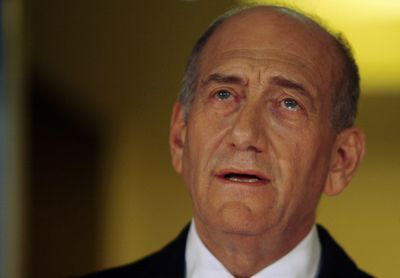Israel’s embattled Olmert to resign
Mideast peace process has uncertain fate

JERUSALEM – Embattled Prime Minister Ehud Olmert announced Wednesday that he will resign in September, bringing a premature end to his hopes of leading Israel into a stable era of peace with its Arab neighbors.
Facing a deepening political corruption investigation, Olmert said he would step aside when his ruling Kadima Party chooses a new leader in seven to eight weeks.
Olmert made it clear that he was reluctantly stepping aside because the expanding corruption allegations had undermined his ability to lead the nation.
“I am not doing this because I cannot fulfill my responsibilities,” Olmert said in a short, live televised address from his Jerusalem home.
“I believe with all my strength in my ability to continue in my mission, just as I believe in my righteousness and my innocence,” he argued. “But this campaign of mudslinging occurring these days, even on the part of fair people who are truly worried about the state and its reputation, raises questions that I cannot and do not wish to avoid.”
Olmert’s decision will make it much harder for him to cement a legacy by securing landmark peace deals with Syria or the Palestinians before he leaves office.
“He is a lame duck and this curtails his ability to do anything really dramatic in the areas of war and peace,” said Yossi Alpher, a former Israeli Mossad official who now serves as co-director of the bitterlemons.org political Web site.
Hopes of reaching peace deals by year’s end were already a long shot, even before Olmert announced he would step aside. Now it is all but certain that the job will be left to his successor.
His announcement came as Secretary of State Condoleezza Rice met in Washington with top Israeli and Palestinian negotiators, including Tzipi Livni, Israel’s popular foreign minister and a candidate to succeed Olmert. Talks, re-launched at the Annapolis conference last November, appear to have made some progress, but the sides have revealed few details, and no breakthrough on key issues appears imminent.
Although Israeli, Palestinian and U.S. officials pledged Wednesday to continue negotiations, a deal is unlikely. Standing in the way are Olmert’s weak standing, Israeli political upheaval that could last into October or beyond and emotional issues such as the status of Jerusalem, the fate of Palestinian refugees and the future of Jewish settlements.
“I don’t think this is cataclysmic,” said Hanan Ashrawi, a moderate Palestinian lawmaker who served as part of the late Yasser Arafat’s negotiating team in the early 1990s. “I don’t think Olmert was the great hope for peace and I don’t think his resignation is the end of peace.”
Calls for Olmert to resign increased in May after American businessman Morris Talansky told Israeli police that he had given the Israeli leader tens, if not hundreds, of thousands of dollars in cash over the last 15 years.
Earlier this month, new allegations emerged that Olmert had double-billed companies and nonprofit groups for travel and then used the money to pay for family vacations.
While Olmert battles the corruption allegations, Kadima Party leaders will be fighting for the right to take his place.
Olmert’s most likely successor in Kadima is either Livni or Shaul Mofaz, the country’s more hawkish transportation minister and former defense minister.
Once Olmert resigns, Israeli President Shimon Peres will have a week to name someone, probably the new Kadima leader, to form a new coalition government.
That person would then have up to 42 days to establish a new coalition. If the attempt failed, Israel would be thrown into elections within three months.
That could open the door for former Israeli Prime Minister Benjamin Netanyahu, the hard-line Likud Party leader who opposes peace talks with Syria and the Palestinians, to return to office.